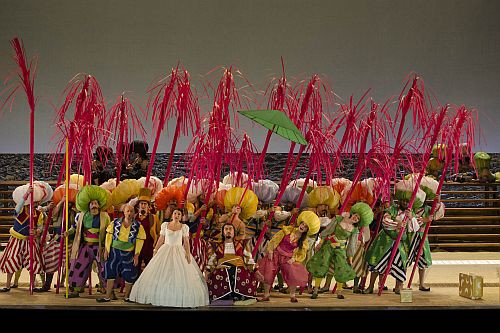 Spain Rossini: L’Italiana in Algeri, Orchestra Comunitat Valenciana, Chorus Generalitat Valenciana, Ottavio Dantone (conductor), Palau de Les Arts, Valencia, 11.3.2014 (JMI)
Spain Rossini: L’Italiana in Algeri, Orchestra Comunitat Valenciana, Chorus Generalitat Valenciana, Ottavio Dantone (conductor), Palau de Les Arts, Valencia, 11.3.2014 (JMI)

Cast:
Isabella: Silvia Tro Santafé
Lindoro: Antonino Siragusa
Mustafá: Simón Orfila
Taddeo: Giulio Mastrototaro
Haly: Germán Olvera
Elvira: Anabel Pérez Real
Zulma: Cristina Alumno
Coproduction: Madrid Teatro Real, Maggio Musicale Fiorentino, Opera National de Bordeaux, Houston Grand Opera
Direction: Joan Font (Comediants)
Sets and Costumes: Joan Guillén
Lighting: Albert Faura
Valencia’s opera season has resumed after an interruption because of problems with decorative work on the facade of the Palau de Les Arts. The truth is that the appearance of the building now leaves much to be desired from an aesthetic perspective, and I hope it will not take too long for it to be restored to its full beauty again.
Last month the performances of Manon Lescaut had to be cancelled, and the season reopened with Rossini’s L’Italiana in Algeri. I had the opportunity to attend the premiere of this production at Teatro Real in Novembre 2009, and here is what I wrote at the time
The result here was not particularly brilliant. It’s an attractive staging with colorful sets and costumes, but the direction continues to treat the opera as farce, and the final result is rather childish, short of life and lightness.
The musical direction was in the hands of Ottavio Dantone. His reading was correct and controlled, but more life and inspiration are needed for this opera to succeed. The sound from the pit was good, but not what we have heard in the past. As usual, the choir was excellent.
The best performance in the cast came from Silvia Tro Santafé, who was a remarkable Isabella, easy on stage and without any problems in her singing. It was not a performance to remember, but it was a very reliable one.
Antonino Siragusa was Lindoro, and he offered both light and shade. Light came from the fact that his voice is well suited to Lindoro, and he is quite easy at the top. The shadows have to do with his unattractive timbre, and with his difficulty in being part of an ensemble, his voice resounding always over those of his colleagues. Mr. Siragusa could give master classes in how to project a voice, but he should take more care when singing with others. There was too much superficiality overall in his singing.
Simón Orfila was a well-suited interpreter of Mustafa. Here again, his voice is not particularly attractive but he knows how to handle it, and he created a compelling Mustafa .
Giulio Mastotaro was a modest Taddeo. I doubt if he is really a baritone. His voice is unappealing, and he cannot compete on stage with the memory of colleagues such as Chausson, Corbelli or De Simone.
Germán Olvera was an unconvincing Haly. His aria del sorbetto reflected an immature interpreter.
Anabel Pérez Real as Elvira offered an attractive light soprano and was good in the ensembles. Cristina Alumno was a serviceable Zulma.
José Mª. Irurzun